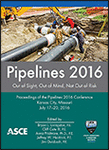Using Electrical Continuity Testing to Improve PCCP Inspection Results
Publication: Pipelines 2016
Abstract
Since electromagnetic inspection using remote field eddy current transformer coupling (RFEC/TC) became commercially available and viable as an inspection technology for prestressed concrete cylinder pipe (PCCP) in the late 1990s, technology providers have relied on calibration of pipes as a means of improving accuracy of results. Calibration is a controlled procedure which simulates the inspection tool’s signal response associated with various combinations of broken prestressing wires. Calibration ideally requires at least two pipes with nearly identical properties to the inspected pipe be removed from the ground and destructively tested. The costs and coordination required to safely perform PCCP calibration while limiting operational impacts render calibration impractical as a means of obtaining higher quality electromagnetic inspection results for most PCCP owners. The limitations of quantifying wire breaks using electromagnetic signals for embedded cylinder pipe (ECP) PCCP without shorting straps is well known and documented in the literature (Engindeniz et al. 2015 and Zarghamee et al. 2012). While the electromagnetic signal can be very sensitive to a single wire break in this type of pipe, the technology tends to over-report wire break quantities for this specific pipe configuration and design. Calibration of the electromagnetic signal to actual wire break quantities is particularly important for this type of pipe, but even with calibration, over reporting of wire break quantities has been reported. A protocol has been demonstrated on City of Phoenix (City) PCCP for improving accuracy of electromagnetic inspection results without calibration. Select pipes with structurally concerning wire break quantities or those reported as “distressed across (DA),” meaning the wire break quantities could not be estimated through electromagnetic inspection were excavated and evaluated for replacement based on external visual assessment and continuity testing. Electrical continuity testing is a non-destructive assessment method using voltage differences between adjacent prestressing wires to measure whether a wire is broken from outside the pipe. If needed, replacement was completed during the same shutdown as the external assessment. Continuity testing was used as a calibration for other City PCCP with similar properties. The protocol has been demonstrated on inspection of over 50 miles of PCCP in the City, including continuity testing or destructive testing of 16 pipes. The testing performed verified the ability of RFEC/TC electromagnetic inspection in non-shorting strap ECP-type PCCP to detect small quantities of broken wires, non-detection of wire breaks near the joint, and over-estimation of wire breaks in the pipe barrel away from the joint. Field verification of the revised wire break quantities reported by the inspection technology vendor after the continuity-testing-based calibration is being considered as a next step in the assessment process.
Get full access to this article
View all available purchase options and get full access to this chapter.
Information & Authors
Information
Published In
Copyright
© 2016 American Society of Civil Engineers.
History
Published online: Jul 14, 2016
Authors
Metrics & Citations
Metrics
Citations
Download citation
If you have the appropriate software installed, you can download article citation data to the citation manager of your choice. Simply select your manager software from the list below and click Download.
